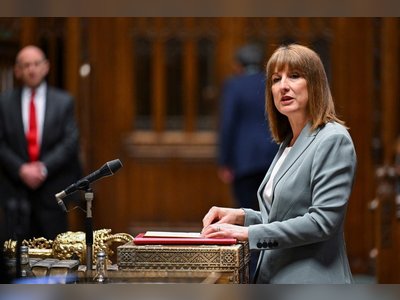Rachel Reeves Signals Tax Increases Ahead of November Budget Amid £20-50 Billion Fiscal Gap
Chancellor emphasises need for ‘fiscal headroom’ as productivity downgrade and spending pressures threaten Treasury coffers
Chancellor Rachel Reeves has indicated that tax rises may be part of next month’s Budget strategy, as she prepares to address a growing fiscal shortfall that analysts estimate could range between £20 billion and £50 billion.
Speaking in Riyadh during a UK delegation visit, she said the government must ensure “sufficient headroom” in public finances and reaffirmed that she would meet the fiscal rules set by her Treasury.
Despite previous assurances that the Labour manifesto pledge not to raise income tax, national insurance or value-added tax remains intact, internal forecasts reveal sizeable risks.
The Office for Budget Responsibility is expected to downgrade UK productivity forecasts by roughly 0.3 percentage points, widening the fiscal gap by as much as £20 billion to £30 billion.
On top of that, think-tank modelling from the National Institute of Economic and Social Research estimates a budget hole of up to £50 billion, largely due to weaker tax receipts and higher debt servicing costs.
Reeves told delegates at the Fortune magazine conference that “we are looking, of course, at tax and spending to ensure that we both have resilience against future shocks” and that the underpinning for economic growth is stability.
When asked whether tax-hikes on the wealthy are on the table, she replied that growth remains fundamental but did not rule out targeted tax measures.
The chancellor is also pursuing trade deals, including with Gulf Cooperation Council states, as a means to bolster revenue without raising taxes across the board.
A deal estimated to add £1.6 billion to the UK economy and £600 million to annual workers’ wages is part of this strategy.
Nonetheless, with headroom estimated at around £10 billion and widely viewed as insufficient, the Treasury faces what analysts call a “trilemma”: raise taxes, cut spending or break the fiscal rules.
While major taxes on working people—income tax, national insurance and VAT—are still formally off-limits, experts point to stealth avenues such as capital gains, dividend income and wealth taxes as likely areas for action.
Reeves emphasized her commitment to keeping taxes as low as possible for working people while delivering sustainable public finances in an “uncertain world.”
Speaking in Riyadh during a UK delegation visit, she said the government must ensure “sufficient headroom” in public finances and reaffirmed that she would meet the fiscal rules set by her Treasury.
Despite previous assurances that the Labour manifesto pledge not to raise income tax, national insurance or value-added tax remains intact, internal forecasts reveal sizeable risks.
The Office for Budget Responsibility is expected to downgrade UK productivity forecasts by roughly 0.3 percentage points, widening the fiscal gap by as much as £20 billion to £30 billion.
On top of that, think-tank modelling from the National Institute of Economic and Social Research estimates a budget hole of up to £50 billion, largely due to weaker tax receipts and higher debt servicing costs.
Reeves told delegates at the Fortune magazine conference that “we are looking, of course, at tax and spending to ensure that we both have resilience against future shocks” and that the underpinning for economic growth is stability.
When asked whether tax-hikes on the wealthy are on the table, she replied that growth remains fundamental but did not rule out targeted tax measures.
The chancellor is also pursuing trade deals, including with Gulf Cooperation Council states, as a means to bolster revenue without raising taxes across the board.
A deal estimated to add £1.6 billion to the UK economy and £600 million to annual workers’ wages is part of this strategy.
Nonetheless, with headroom estimated at around £10 billion and widely viewed as insufficient, the Treasury faces what analysts call a “trilemma”: raise taxes, cut spending or break the fiscal rules.
While major taxes on working people—income tax, national insurance and VAT—are still formally off-limits, experts point to stealth avenues such as capital gains, dividend income and wealth taxes as likely areas for action.
Reeves emphasized her commitment to keeping taxes as low as possible for working people while delivering sustainable public finances in an “uncertain world.”









